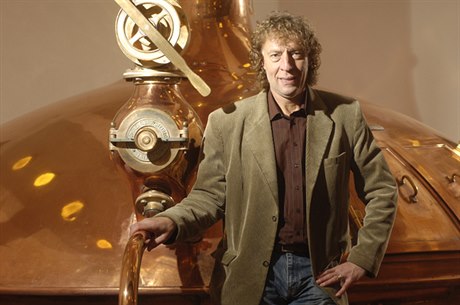On the bus trip to Humpolec it is already clear that Stanislav Bernard is a popular and well-known personality in Vysočina. “I even wish him his Porsche in front of the brewery. He brews good beer and he’s an honest guy,” one of our fellow passengers tells me. Other Humpolec citizens also reacted similarly to the co-owner of the Bernard family brewery, which in 2011 won 47 awards and whose black lager with its subtle fermentation is the proud holder of the prestigious title “World’s Best Dark Lager.”
At the present time, Stanislav Bernard is a noteworthy personality not only due to beer, but also to his engagement in public life, primarily as a member of the administrative council of the Anti-Corruption Endowment Fund (NFPK), which has instigated a number of serious causes during recent months, especially in relation to the Prague municipal transport company and Minister Jaromír Drábek’s (TOP 09) Ministry of Labour and Social Affairs.
In an interview with Czech Position, Bernard talks about the so-called post-Communist cheating of the state and puts the boot into Nečas’s government, which is raising taxes contrary to concept. Among others, he says “Whenever people are proud of something, they’re not going to destroy it themselves. The level of thieving is lower where people love their country. I know that from my company.”
Q: To begin with, I’d like to ask the same question I asked your colleague in the Anti-Corruption Endowment Fund, Karel Janeček: Does involving yourself in various corruption cases complicate your life? Do you fee like a neo-dissident?
BERNARD: I don’t feel like a dissident. I’m just not indifferent to where I live — whether in a plundered country or one that is going somewhere. My motivation for engaging in the endowment is simple. When the revolution came and the Communist regime fell, I said to myself: “Fine. Let’s go and build something that makes sense and prospers, create a slimmed down state which doesn’t bother people with bureaucracy and which has a strong economy”. What do I mind today? That such a corrupt environment has been created on a state-wide scale that it fundamentally damages the Czech Republic. I repeat, fundamentally.
Q: Your detractors criticize the way you took over the Humpolec brewery. Allegedly you were a member of the privatization committee in Opava. Were you prepared for that kind of barrage?
BERNARD: I was, and I own up to it without a problem. We partners bought a brewery that was earmarked for closure under terrible conditions. It was an auction in the context of the small privatization which five applicants entered and which anyone else could have entered. The auction price for the ruins of the brewery climbed to an insane Kč 45 million plus Kč 7.0 million for mostly unnecessary, unusable inventory. At the same time, its residual value was Kč 9.5 million, so we bought the brewery at auction for five times its value. I don’t know of many less profitable privatizations in the Czech Republic - actually no similar one. I wouldn’t talk about “detractors” — who throw dirt to distract attention from their own frauds. I’m only interested in them in connection with exposing their thievery.
Twenty years later, the ruins have been turned into a brewery brewing interesting beer. In our company, which together with the malting company regularly employs 170 people, shared company values, which the employees themselves thought up, are applied. The great majority of our people are proud of the company, because they know that we are doing something substantial together. The atmosphere in the company is friendly. I say that because we have succeeded in creating a sort of micro-space, where the normal rules of the game operate and where there is no theft and fraud.
Q: Nevertheless, do you not regret going into battle against the shadowy figures of local politics?
BERNARD: No, on the contrary, it gives me hope that one day it will be better.
Post-Communist cheating of the state
Q: Almost three quarters of the public thinksthat the majority of, or almost all public representatives are involved in corruption. What is the cause of this status?
BERNARD: The Czech Republicis a post-Communist country.Unfortunately, under the former regime the state was equal to the Communist Party,which was a criminal organization that raped the whole country, prevented capable people from being capable, made everything average, locked people up in rabbit cages and barely fed them. So the great majority of people excused robbing the state by saying that they were actually robbing the hated Communists. It was not generally regarded as something unfair. Unfortunately, this condition has persevered to the present day and developed to obscene and enormous dimensions. Instead of this malaise being tackled after the revolution, the problem, on the contrary, has gained ground.
Q: What impact has corruption on the state and on society?
BERNARD: I see two levels here. Firstly, there is the enormous damage that corruptive behavior has on people’s morale.That doesn’t just affect “those at the top” though.Take for example that there is bribery even in third or fourth division football, i.e. in the lowest level competitions. Corruption eats through the whole of society. People prefer to see the mistakes of others. Those who carry out corruption — even if is a matter of a few thousand crowns — don’t realize that they are actually doing the same as those “at the top,” only with regard to smaller amounts.
Secondly, people are discouraged when they see that in politics — at the highest level — there is theft and it is taken as part of the game. A fundamental issue is that the state controls elements — the courts, state representation and the police — are suppressed and put out of a job. It’s as if they didn’t exist. Those who steal have a big influence on the functioning of these control mechanisms and feel themselves to be immune from prosecution.When the societal demand for justice is low and the control elements are put out of operation, then why wouldn’t you have theft?
Q: Is the level of corruption escalating?
BERNARD: I feel it is. The longer the controlling elements of the state are out of operation,the more these people’s feeling of immunity grows. A weakness of democracy also is that politicians often feel that they probably won’t win the next election, so it’s as if they say “After us the flood, so pack up, i.e. steal what you can quickly.”
Q: Do you think that if politicians and civil servants approached public administration with fiduciary duty and not like hungry wolves, the state budget would not be in such a desolate state?
BERNARD: Undoubtedly. Aside from the moral aspect, the second fundamental aspect of corruption is the economic one. Corruption, that is, is a very expensive and uneconomic thing. Civil servants do not have the same motivation as private operators,when they organize a tender,to do it honestly and economically. I’m convinced that the level of thievery and uneconomical conduct of the state is roughly equal to the state budget deficit.This is enormous money that could be spent to some purpose.We could have budget surpluses. Our company, for example, even in this complicated time is creating financial reserves, even though 20 years ago we started from an incomparably worse position than that in which the whole of the Czech Republic is today.
There are many options where money doesn’t have to be unnecessarily wasted or stolen outright. I would give as examples motorway construction, the looting of state and semi-state businesses, IT system contracts, healthcare, environmental conservation and money laundering through companies in tax havens, which comes back to the election budgets of political parties.It’s an enormous moral gamble. It causes enormous debt instead of having reserves and surpluses.
Nečas’s tragic government
Q: How do you assess the activities so far of Nečas’ government?
BERNARD: This government is the biggest political disappointment I have ever experienced. For the first time, a center-right coalition had a very comfortable majority. If it had a stronger leader,and not Petr Nečas (Civic Democrat, ODS) who is more a clerk than a leader, and if the “VV” (Public Affairs) people and the pragmatic [TOP 09 finance minister Miroslav] Kalousek weren’t there, then it would be possible to do an enormous chunk of work and change the country for the better. They called themselves the "anti-corruption government," but they’ve done almost nothing in this area.
Even the celebrated act on public contracts is a smokescreen, because anonymous registered shares were not abolished, so public tenders can still be entered by companies that are owned by anyone - even those who influence the decision-making in public tenders. This government as a whole is wasting an enormous opportunity to make radical reforms and heal the country. Obviously I also see positive exceptions, for example health minister Leoš Heger (TOP 09) or justice minister Jiří Pospíšil (ODS).
Q: If people don't believe in the government's proclaimed efforts to take on the juggernaut of corruption,then they are not likely to accept “belt-tightening”...
BERNARD: When people are treated fairly they are willing to bear some discomfort. We struggled for 10 years in the brewery against those insane start-up conditions — to survive. Our people understood that. Only in recent years have we been successful and we are creating some kind of financial cushion for any further economic-financial crisis. It definitely hasn't ended with Greece. All the more reason why the corruption aspect is dangerous.
Q: What do you say to the government’s taxation policies?
BERNARD: The government is acting absolutely chaotically in this area. First it raises the lower VAT rate at the start of the year from10 to 14 percent, and now they’re talking about increasing both the lower and the upper rates by one percent. If taxes are going to be raised, then it should be done once and for all with a clear intention, not do it 10 times and keep changing the parameters. They have no vision, no clarity, about where they want to get to. It seems to me a lot less like a unified taxation and economic policy than like dealing between market traders.
In this regard I have one more comment. I am amused by the approach of Česká televize (Czech public TV). In the news, the readers list the taxes that the coalition is raising and they call it savings. How is it that public service media editors aren’t capable of expressing themselves sensibly? What’s the saving in raising taxes? Nothing.
Q: In 2008 you were an ODS candidate for the Senate. Has the party changed ideologically since that time?
BERNARD: In recent years the Civic Democrats have become for me an untrustworthy party, even though I did run on their platform then as an independent candidate. They are gradually losing their original program based on personal responsibility of each for his own life, of a vision of a slimmed down state and low taxation. They are acting halfway Leftist. And most importantly, too many people in the ODS or its circle are connected with massive corruption. And that’s what’s worst.
If I go back to the issue of raising taxes again,the government is doing nothing more than pouring more and more water into a leaky bucket instead of first patching up the holes: by that I mean maximum restricting corruption. This government is behaving very unwisely. In economic policy too they are taking steps that exacerbate the situation. Increasing the tax burden only causes us to be less productive. The problem is that right-wing policies require the moral consistency of right-wing politicians. If that aspect fails among them, then many people will rightly not trust right-wing politics.
The crazy world of the Left
Q: Do you think that when the Left comes into power, the situation and the political relationships will change for the better?
BERNARD: The Left is already threateningto abolish the reforms that Nečas’ government has at least begun. It’s a crazy world. At the same time, the Left will have to cut costs too. There is one problem: there are people mixed up in politics who did nothing more than go straight from school into politics — for example Bohuslav Sobotka [the Social Democrat (ČSSD) leader] and others — and then they “blabber” whatever comes to mind. I would recommend just one thing to those people: Go and spend some time making a living with your bare hands or your head and only then start thinking about politics.
I don’t think, though, that politicians themselves have such a fundamental impact on the economy — it lives its own life. It’s necessary to create the correct conditions for it, though, which unfortunately are now worsening. Now it’s necessary primarily to revitalize the control mechanisms of the state -the courts, state representation, and the police. It won’t be easy, however. Look, for example, at the Public Prosecutor’s Office in Prague. It’s very important to get trustworthy and competent people into these posts.
Q: What do you mind most about the Left-wing concept of politics?
BERNARD: The greatest corruption of all on a giant scale is pre-election populism and promises. This is primarily the Left-wing domain and I don’t believe that those particular politicians are doing it for the citizens, even though they behave like it. The simplest, but at the same time most damaging, recipe for election victory is the absence of responsibility and lots of unrealistic promises. This will gradually lead the economy inevitably to collapse.
Otherwise it applies that thievery goes on to roughly the same extent on the Left and on the Right,only now the Right is in power and the Left is not holding the purse strings. Unfortunately we lack a political tradition and we have bad historic experiences. And most of all we lack national pride, even though there are things that are succeeding. Not everything is bad. Whenever people are proud of something, they’re not going to destroy it themselves. The level of thieving is lower where people love their country. I know that from my company.
We’re missing Havel
Q:Should the state be run like a company,as for example the entrepreneur Andrej Babiš suggests?
BERNARD: I’m opposed to revolutionary solutions and similar nonsense. No shouting into the dark in the manner of the Holešov Appeal. It’s not difficult to smash something and drive in wedges. Problematic situations should not be handled by the mob because the mob has no reason; mobs are ruled by negative emotions. So far, no one has thought up anything better than parliamentary democracy, crazy as it might befrom the point of view that to push anything through Parliament is often a big problem, whether due to lobbyism (in the negative sense of the word) or due to the dumbness of the deputies. What Andrej Babiš says — that the state should be run like a company — that kind of view is close to my heart, but I don’t know how the state could be run like a company in a parliamentary democracratic system.
Q: Is Václav Havel missed in today’s Czech society and politics?
BERNARD: I wouldn’t want to simply idealize [former] President Havel, because there were certain times when I didn’t agree with him internally. I respected him very much as a person, though. He was a moral authority and we are greatly lacking a person like that. He was consistent in his opinions. But now there is no such strong personality who would be capable of handling the current morass. Obviously there are strong personalities elsewhere in society. In Czech politics, however, there’s more than enough human pettiness.
Q: Do you ever think you might bring your experience from the private sphere into politics?
BERNARD: No.I have no political ambitions. I do what I regard as necessary. For that reason, for example, I engaged in the Anticorruption Endowment Fund. In our company I influence what I can by example. We saved the brewery in Humpolec and the malting plant in Rajhrada by Brno. That’s no small feat. I really don’t want to go into politics. I want to live my life.





